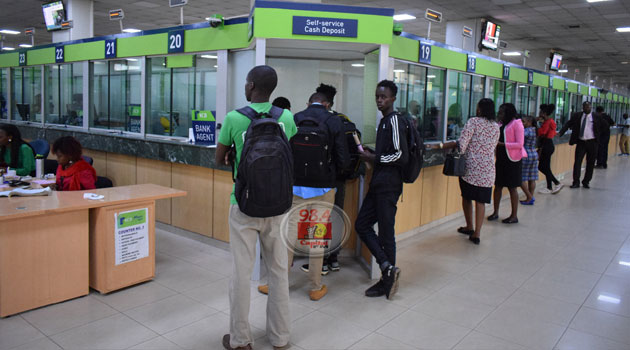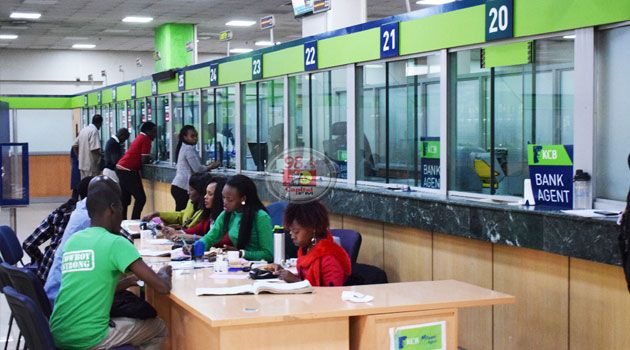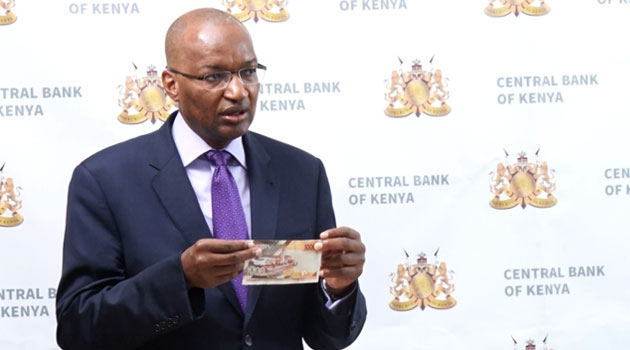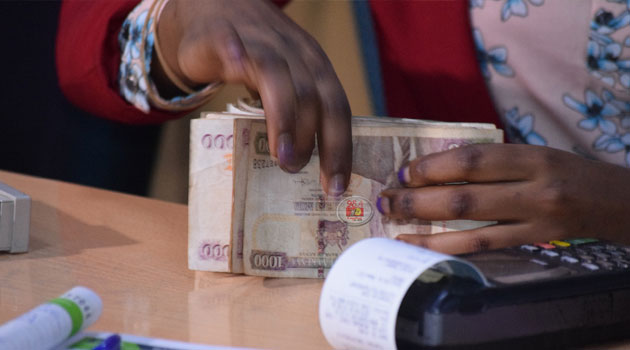
A spot check by Capital FM News at Kenya Commercial Bank (KCB) branches in Nairobi, Standard Chartered, Equity and Commercial Bank of Africa (CBA) revealed that banks were running normal operations, with no extra-ordinary activities of Kenyans trying to beat the deadline of getting rid of the old-generation notes/CFM – MOSES MUOKI
NAIROBI, Kenya, Sep 30 – There were no long queues in banking halls Monday, the last day for swapping the old Sh1,000 notes for the new currency, in what surprised many from Kenyans who are known for a last-minute rush on anything.
A spot check by Capital FM News at Kenya Commercial Bank (KCB) branches in Nairobi, Standard Chartered, Equity and Commercial Bank of Africa (CBA) revealed that banks were running normal operations, with no extra-ordinary activities of Kenyans trying to beat the deadline of getting rid of the old-generation notes.
Maurice Omondi, a businessman in Nairobi said majority of Kenyans use MPESA to avoid handling cash “which is why they did not have money to return.”
“I have been using MPESA and I know majority of Kenyans do the same so it was easy for me to return the few notes I had. I mostly prefer cashless transactions,” he said.
Kevin Njoroge and Ben Kioko, both taxi drivers in Nairobi believe that some Kenyans used the money for investments to avoid being questioned about the source of their money in case they returned the old notes in huge amounts.
“The issue is not returning the money. Many people are fearing being asked where they got the money but if they were allowed to return even over a million notes without many questions, I am sure everyone would have returned those notes,” Njoroge said.

The central bank in June said there were roughly 218 million 1,000 shilling notes in circulation, but declined to say what proportion was being stashed as black money/CFM – MOSES MUOKI
Central Bank of Kenya Governor Patrick Njoroge has declared there will be no extension of the deadline that was set on June 1, when he unveiled a new set of all currency notes to replace the old ones.
But it is the Sh1000-note, the largest denomination that is being demonetized.
“There will be no extension at all,” Njoroge declared recently, while urging Kenyans to heed to the October 30 deadline.
CBK officials said Kenyans had only exchanged slightly more than half of the targeted 217 million pieces of Sh1000 old-generation notes that is in circulation.
Would people with huge hordes of cash have resigned to fate for fear of answering questions on the source of their illicit cash?
That was the big question CBK officials were left wondering where the money could have gone.
Most wholesale and retailers across the country started declining old notes a week to deadline, fearing they may be caught up with time for the exchange.
Giant telecommunications company Safaricom and supermarkets like Naivas, Tuskys and Carrefour already stopped taking the old notes, days to the official deadline.

CBK Governor Patrick Njoroge displays the new Sh1,000 note that replaced the old generation. CFM-FILE.
Fast-food outlet Pizza Inn, Chicken Inn and Creamy Inn on Thursday informed customers of their decision to only take new currency notes for Sh1000.
The trend was similar in Public Service Vehicles where conductors in some routes already started rejecting the old sh 1000 notes since Friday.
The operation launched in June 2019 is aimed at flushing out dirty money being hoarded by tax evaders, crooked businessmen and criminal groups.
Large deposits of the old notes, embossed with the image of Kenya’s founding father Jomo Kenyatta, raise alarm bells at banks and require paperwork to prove their origin.
The central bank in June said there were roughly 218 million 1,000 shilling notes in circulation, but declined to say what proportion was being stashed as black money.
Kenyan economist Aly-Khan Satchu said devaluing these bills works by “taking its owners by surprise”.
“Four months is a short period of time when you want to launder big sums of money,” he said.
“People who have that money will definitely try to save what they can”.
– Car wash –
So people are getting creative, devising schemes to quickly unload small amounts of their cash while avoiding detection by the authorities.
John, a car dealer in Nairobi, recalled his customer last week counting out thousands upon thousands of banknotes to purchase a luxury car worth $74,000 (67,000 euros).

Central Bank of Kenya Governor Patrick Njoroge has declared there will be no extension of the deadline that was set on June 1, when he unveiled a new set of all currency notes to replace the old ones. But it is the Sh1000-note, the largest denomination that is being demonetized effective September 30/CFM – MOSES MUOKI
“People want to get rid of their old notes, but they know very well that questions will be asked if they go put the money themselves in the bank,” said John, who declined to offer his real name due to the nature of his business.
“When I go to the bank to deposit money from a car sale, people ask for the papers from the sale, sometimes even copies of emails, but it never goes further.”
Other businesses are finding a lucrative side trade in washing 1,000 shilling notes through their tills — for a bit in return.
“I was approached by a friend through another friend and we struck a deal. I get around 500,000 shillings every day to bank together with my daily sales,” said a liquor shop owner who declined to be named in Hurlingham, a district near downtown Nairobi.
“In return I get between five and 10 per cent, depending on the amount.”
The amounts being deposited are below one million shillings, the threshold at which banks required detailed paperwork under a new transparency policy imposed by the central bank in June 2018.

CBK officials said Kenyans had only exchanged slightly more than half of the targeted 217 million pieces of Sh1000 old-generation notes that is in circulation//CFM – MOSES MUOKI
– Gentlemen’s agreement –
One canny businessman in western Kenya dished out his cash in the form of small, interest-free loans of around 50,000 shillings.
The amounts are low, so those exchanging the old bills avoid detection, and upon returning the debt his money is cleaned into new bills.
“Nothing is written down, it is a gentleman’s agreement,” he said, declining to be named.
Other methods involve sinking cash into real estate or investment funds, or businesses moving large volumes of money, several businesspeople told AFP.
But it’s not all underhanded and hush-hush.
One bar in the coastal city of Mombasa is offering to swap banknotes on behalf of drinkers, encouraging punters to spend big at their “Old Notes Send Off Party” being held the eve of demonetisation.

































